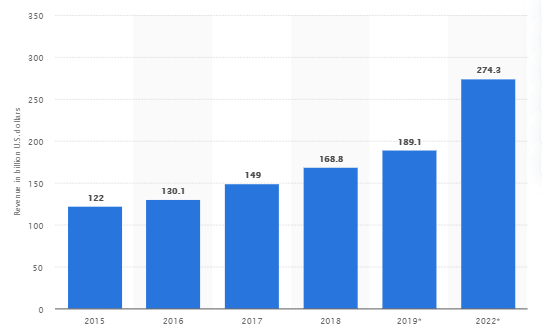Breaking into big data industry domain is not an easy nut to crack, especially in the contemporary times, wherein the competition is really intense in the job markets for the coveted data science job roles. However, the job openings too, are considerably high in the big data domain, given the dearth of big data professionals across business verticals.
Data analytics is a booming industry and the job opportunities in the said field of profession are extensive. As per a Statista study, the worldwide big data analytics market’s value was $168.8 billion in 2018, which is expected to rise to a whopping $274.3 billion by the year 2022, thereby registering an impressive CAGR of 13.2%. This year alone, each person on the planet, on an average, produced 1.7 MB of data per second. Web users worldwide, currently are generating 2.5 quintillion bytes of data every single day.

Forecasted big data analytics revenue worldwide amid 2015 & 2022 (in billion USD)
Source: Statista
Big Data Employment & the Role of Certifications
Industry-relevant big data certifications act as a catalyst in an aspirant’s career-path in the data analytics industry. Firstly, you gain a distinct competitive edge that puts you miles ahead of your competitors. Secondly, recruiters prefer individuals with data science credentials under their name. Thirdly, certifications help you climb the career ladder fast once you get a break into the concerned industry. And lastly, you are considered more valuable to a company and are hence seen as a prized asset.
If you are one of those individuals seeking a rewarding big data career, this article is a custom-fit for you. Here, we are discussing the top 5 data science certifications that will help the upcoming big data professionals shape a promising career.
5 Data Science Certifications in 2021 to Enrol Into
Cloudera Certified Professional
Cloudera is among the world leaders when it comes to offering industry-relevant big data certifications. By enrolling into the said big data certification program, you will not only learn about the fundamentals of big data analytics, but alongside, will also be able to gauge your existing data science skills as they will get tested during the course of the program. Cloudera has got a range of certification programs in data science for professionals at any stage in their career. The data science credentialing programs by Cloudera offer learning to their students on the vital software frameworks such as Hadoop Administration, Hadoop Development, and Apache Spark. One can choose a specific program basis their needs and interest by visiting Cloudera’s online portal.
Associate Big Data Engineer (ABDE)
ABDE by DASCA (Data Science Council of America) is among the best data science certifications available online for data science aspirants. It’s a globally-recognized data science credential that is preferred among the recruiters at the top companies across industry sectors. If you are a young individual seeking a rewarding big data career, ABDE would prove to be an apt choice for you to enrol right now to reap humongous benefits in the near-future.
Being a graduating university student, or having just completed your undergraduate degree course, in both cases, ABDE will benefit you immensely, if you are seeking a big data career. The best suited educational background to enroll for this custom-designed data science credential for university graduates and early-career big data professionals would be a degree in any of the following subject disciplines – Computer Programming/ Software Engineering, Economics, Mathematics, Statistics, Information Technology, or any related subject.
ABDE is considered as the world’s most valued 3rd-party vendor-neutral data science certification for graduating college & university students who would like to break into the booming data science industry.
Microsoft’s MCSE – Data Management and Analytics
When it comes to data analytics and advanced technology, you simply cannot leave Microsoft behind. Microsoft’s MCSE data science certification will train you on data analytics tools and frameworks that are specific to Microsoft. Having gone through the certification program, you will come out as a qualified professional who can work effortlessly on Microsoft tools and software frameworks that are specific to SQL Database Administration, Business Intelligence Reporting, and Machine Learning. The said data science credentialing program will allow you to hone your skills in deploying business intelligence data for firms pertaining to varied industries.
SAS Certified Data Scientist
SAS certifications in data science are among the most popular and reputed ones worldwide. The SAS credential we have mentioned in here is among the most challenging certifications for data science professionals. The program is specifically drafted to gauge an individual’s data science skills by providing him with big data and eventually testing, whether he can use various open-source and SAS tools.
Associate Big Data Analyst (ABDA)
ABDA by DASCA (Data Science Council of America) is best suited to graduating students interested in building a data science career, and have opted in for subject disciplines (in their respective degree programs) such as Applied Mathematics Economics, Mathematics, Statistics, Marketing, Management, Business, Computer Science, and the other related ones. The ABDA credential will help these young guns step into the field of data analytics with much ease, as there exists an intense competition for data science job roles in the global job markets. ABDA is a preferred credential and a known name among recruiters at top companies across business sectors.
ABDA is counted among the world’s most powerful & valuable 3rd-party vendor-neutral certification for young graduating students at business schools and universities. It’s an internationally-recognized data science credential that offers a distinct competitive edge when you are an undergraduate student with no prior work experience in the concerned industry, and looking desperately to enter the world of big data analytics.


